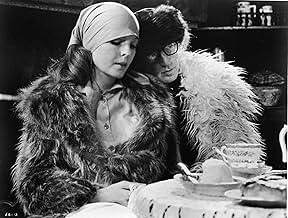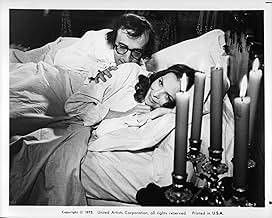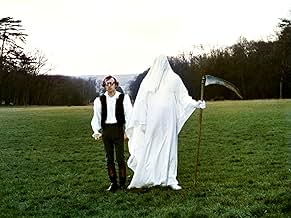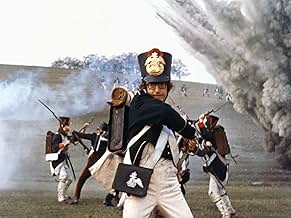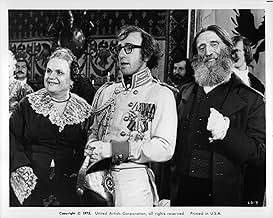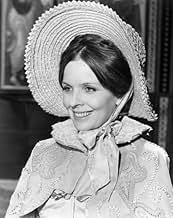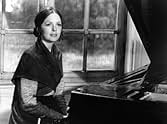Im zaristischen Russland schmieden ein neurotischer Soldat und sein entfernter Cousin ein Komplott zur Ermordung Napoleons.Im zaristischen Russland schmieden ein neurotischer Soldat und sein entfernter Cousin ein Komplott zur Ermordung Napoleons.Im zaristischen Russland schmieden ein neurotischer Soldat und sein entfernter Cousin ein Komplott zur Ermordung Napoleons.
- Auszeichnungen
- 1 Gewinn & 1 Nominierung insgesamt
- Mikhail
- (as Feodor Atkine)
- Rimsky
- (as Yves Barsaco)
- Servant
- (as Gerard Buhr)
- Ivan
- (as Henry Czarniak)
Empfohlene Bewertungen
Unlike any other of his films, this deals with his "deep" questions of death/metaphysics in an unflaggingly light and comical fashion. For instance:
Sonja: But judgment of any system or a priori relation of phenomena exists in any rational or metaphysical or at least epistemological contradiction to an abstracted empirical concept such as being or to be or to occur in the thing itself or of the thing itself.
Boris: Yeah, I've said that many times.
Not Woody's "best" film (see Annie Hall, Manhattan, Crimes and Misdemeanors), but perhaps his most laugh-filled. Satisfying throughout. I give it a 9/10.
One of the better lines, "To love is to suffer. To avoid suffering one must not love, but then one suffers from not loving. Therefore, to love is to suffer, not to love is to suffer, to suffer is to suffer. To be happy is to love, to be happy then is to suffer but suffering makes one unhappy, therefore to be unhappy one must love or love to suffer or suffer from too much happiness. I hope you're getting this down."
This classic comedy is very rarely known, and worth watching it over and over.
Indeed, "Love and Death" is not only an homage to literature, but also to early screen comics. There's even a scene where the sound goes out for some silent slapstick, and the fourth-wall-breaking absurdity of the whole thing seems to be especially indebted to the Marx Brothers. As for the Russian connection, though, there are extended mock-philosophical discussions, angst over the existence of God, somber soliloquies, multiple suitors and lovers for everyone, subplots upon subplots and periphery character galore, a lot to do with class and nationality, and... wheat, I guess. (I love that in a blog post from Alistair Ian Blyth that one of my favorite films of the 1910s, "After Death" (1915), which is based on the prose of Ivan Turgenev, is brought up to help explain the supposed importance of wheat in Russian literature.)
Some of the Dostoevsky references are obvious. Allen has a conversation in a jail cell that entirely exists of characters and titles from his stories, including some gossip about a local named "Raskolnikov" who murdered two women. Additionally, Diane Keaton's character is named "Sonja," the hooker with a heart of gold who instigates Raskolnikov's regeneration in the book. "Love and Death" offers the best character summary of Sonja, though, from her own lips: "I'm half saint, half wh-re" (IMDb censorship, you know). And, naturally, Allen plays the atheistic foil to her pious promise land. Best of all, however, is how the connection with Napoleon between "War and Peace" and "Crime and Punishment" is exploited in this film with two other words surrounding the conjunction. Sonja decides that she and Allen's Boris should kill Napoleon for the benefit of humanity, which is akin to the rationale of Raskolnikov for murdering the pawnbroker. Ironically, Napoleon was also his role model for this "extraordinary" act. Boris mixes up the roles further by comparing himself to an insect, which is what Raskolnikov said of the pawnbroker, and claiming Napoleon as a great man. Looking at the parodic adaptation this way gives one as much whiplash as Allen and Keaton's philosophical repartee. To top it off, there are two Napoleons.
There are some allusions to non-comedic films here, too. The ones to "Battleship Potemkin" (1925) and "Persona" (1966) seemed most conspicuous to me. Although "Love and Death" is a lightweight affair, and the jokes are hit and miss, it rewards those who've seen and read what it parodies. And, admittedly, Russian novels such as "Crime and Punishment" were just asking for this sort of loving pillory.
Wusstest du schon
- WissenswertesIn an interview with 'Esquire' magazine, Woody Allen once said of the making of this movie: "When good weather was needed, it rained. When rain was needed, it was sunny. The cameraman was Belgian, his crew French. The underlings were Hungarian, the extras were Russian. I speak only English - and not really that well. Each shot was chaos. By the time my directions were translated, what should have been a battle scene ended up as a dance marathon. In scenes where Keaton and I were supposed to stroll as lovers, Budapest suffered its worst weather in twenty-five years".
- PatzerThe young Boris has blue eyes, but the adult Boris has brown eyes.
- Zitate
Sonja: To love is to suffer. To avoid suffering one must not love. But then one suffers from not loving. Therefore, to love is to suffer; not to love is to suffer; to suffer is to suffer. To be happy is to love. To be happy, then, is to suffer, but suffering makes one unhappy. Therefore, to be unhappy, one must love or love to suffer or suffer from too much happiness. I hope you're getting this down.
- Crazy CreditsRussian composer Sergei Prokofiev is listed in the credits as "S. Prokofiev," just the way he would have been listed in the credits of a Russian film.
- Alternative VersionenThe MGM DVD release deletes the pre-title Prokofiev overture.
- VerbindungenFeatured in V.I.P.-Schaukel: Folge #7.3 (1977)
Top-Auswahl
Details
Box Office
- Budget
- 3.000.000 $ (geschätzt)
- Bruttoertrag in den USA und Kanada
- 20.123.742 $
- Weltweiter Bruttoertrag
- 20.123.742 $


